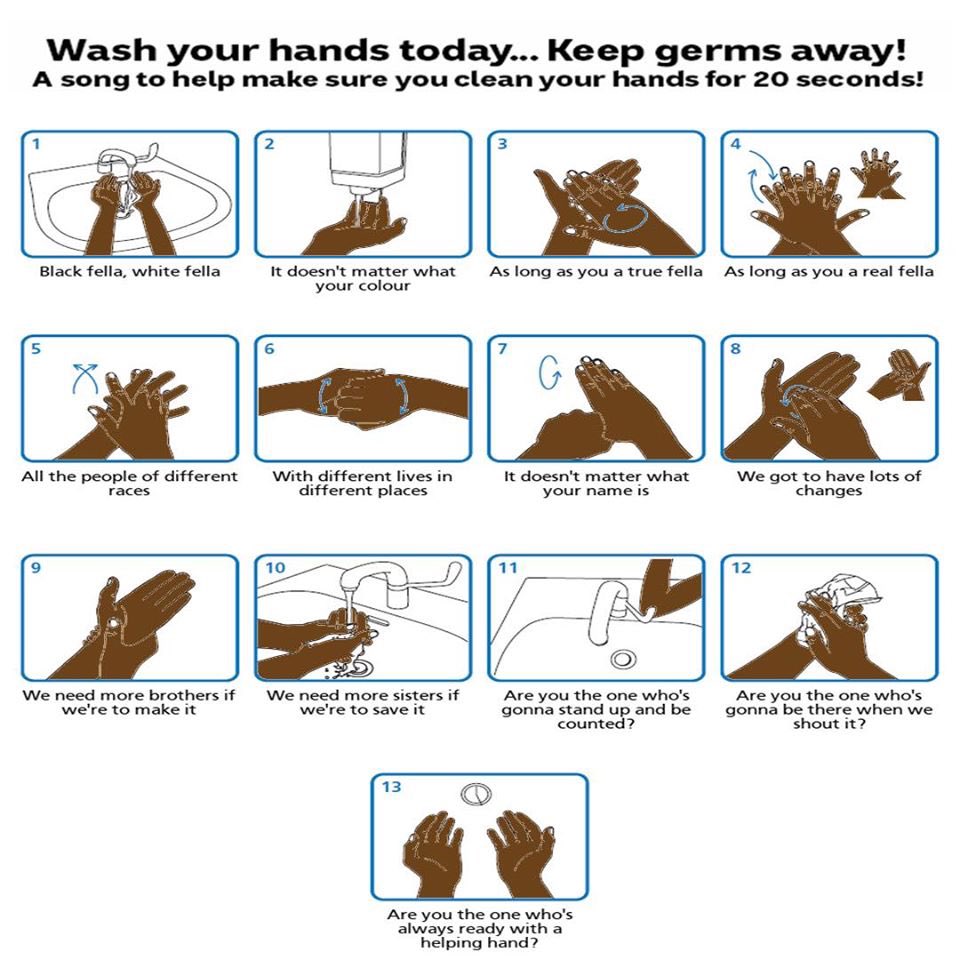19th March 2020
The upcoming months are going to be really challenging for our mob
So we need to look after each other and stay safe from getting sick.
Here are some things you can do to reduce your risk of coronavirus
- Wash your hands often with soap and running water.
- Do not to touch your eyes, nose or mouth. Cover your nose and mouth with a tissue when you cough or sneeze. If you don't have a tissue cough or sneeze into your upper sleeve or elbow.
- Stay at home if you feel sick. Continue healthy habits: exercise, drink water, get plenty of sleep.
- Wearing a face mask is not necessary if you are well.
- Buy an alcohol-based hand sanitiser with over 60 per cent alcohol.

What are the symptoms of Coronavirus?
Many people will suffer only mild symptoms, but those most at risk may experience severe symptoms. Based on what we know about coronavirus, those at higher risk of serious infection are:
- people with immune system issues (such as people who have cancer)
- Elders
- Aboriginal and Torres Strait Islander peoples (as we have higher rates of chronic illness)
- people with chronic medical conditions
- people in group residential settings
- people in prison
The most common symptoms include:
- Fever
- Breathing difficulties such as breathlessness
- Cough
- Sore throat
- Fatigue or tiredness
How does Coronavirus spread?
Coronavirus spreads through close contact with an infected person; mostly face-to-face or within a household.It cannot jump across a room or be carried for long distances in the air.Close contact means greater than 15 minutes face-to-face or the sharing of a close confined space for more than two hours with a confirmed case.
A close contact could include any person meeting any of the following criteria:
- living in the same house or building
- a person who spent two hours or longer in the same room; or
- face-to-face contact for more than 15 minutes with the case in any other setting not listed above.

What should you do if you think you might have Coronavirus?
If you are concerned about any symptoms you might have:
- Ring the Coronavirus 24-hour national hotline 1800 020 080, or a GP or emergency department, to arrange for testing and appropriate care.
- You can also contact your local AMS if you need medical advice.
It is important to monitor any symptoms you have, but not everyone needs to get tested.
Tips for caring for mob
Elders or family and friends who have other health and medical conditions can be at higher risk of Coronavirus.
- Food, medicine and essential items - check what you mob have at home and make sure that if they take regular medication they have extras on hand. Picking up groceries or medicine for them is a helpful way to reduce the changes of them coming into contact with Coronavirus.
- Create an emergency contact list - have a list of emergency contact numbers handy and a plan for if your mob fall ill so they know what to do if they feel unwell, including contact numbers for local GPs, AMS or medical centre.
- Stay connected - even though we are keeping physically distant, it's important we stay connected. Pick up the phone and have a yarn with family and friends, and check in regularly on each other during this time.
-
Limit community gatherings - it is better to self-isolate than risk exposing others so be cautious and stay connected in other ways.
Supporting mob living with a disability or chronic illness
Offer extra support to people with a disability at this time. Things like dropping off care packages, assisting with set up in the event of quarantine, organise a support plan.
Check-in and reach out over the phone and internet.
Take extra precautions when visiting - wash your hands and if you are sick, don't risk their health and safety. Call on family and friends who are well and ask them to help out.





